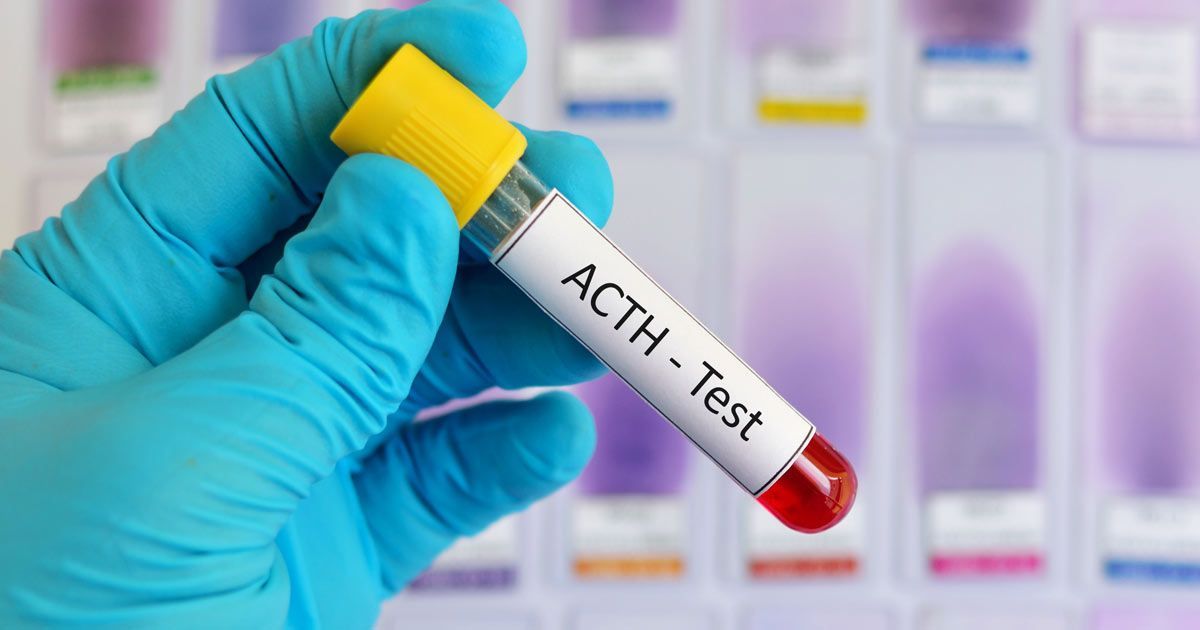Addisons Disease Treatments NYC - Dr. John Salerno

Addison's Disease Symptoms, Causes, and Treatments by Salerno Wellness in Manhattan, NY, and Connecticut
I'm Dr. John Salerno, and for more than 30 years, I've helped patients overcome debilitating conditions like Addison's Disease through integrative and functional medical treatments. I understand how challenging it can be to live with such a life-altering condition, and I am here to assure you that there is hope. Addison's Disease can significantly impact your quality of life, but by addressing the root causes and treating the condition comprehensively, we can find effective solutions together. My approach combines modern medicine with complementary treatments designed to improve your overall well-being, and I'm committed to guiding you every step of the way.
-Dr. John Salerno
What is Addison's Disease?
Addison's Disease, also known as primary adrenal insufficiency, is a rare but serious condition that occurs when your adrenal glands fail to produce sufficient levels of essential hormones. These glands, located above your kidneys, are responsible for producing cortisol and aldosterone. Both of these hormones play crucial roles in regulating your metabolism, blood pressure, and the balance of salts and fluids in your body.
When the adrenal glands are not functioning properly, many of your body's vital processes can be disrupted. Cortisol, often known as the "stress hormone," helps your body respond to stress, maintain glucose levels, and manage inflammation. Aldosterone, meanwhile, regulates sodium and potassium balance, which affects blood pressure. Without these hormones, your body can experience a wide range of uncomfortable and potentially dangerous symptoms.
Addison's Disease can develop at any age and affects both men and women equally. It is usually caused by an autoimmune response where the immune system mistakenly attacks the adrenal glands. Other causes include infections, genetic disorders, or damage to the adrenal glands. Because Addison's Disease progresses slowly, early symptoms are often overlooked, which makes timely diagnosis and treatment essential for stabilizing the condition.
Addison's disease is named after Dr. Thomas Addison, a British physician who first described the condition in 1855. Dr. Addison was a pioneer in the field of medicine and worked at Guy's Hospital in London. He is credited with identifying and documenting the symptoms of what he called "a peculiar form of anemia," which we now know as Addison's disease or primary adrenal insufficiency.
In his groundbreaking work, Dr. Addison observed patients with symptoms such as extreme fatigue, weight loss, low blood pressure, and skin discoloration (hyperpigmentation). He linked these symptoms to damage or dysfunction of the adrenal glands, which are responsible for producing essential hormones like cortisol and aldosterone. His detailed observations and clinical descriptions laid the foundation for understanding this rare but serious endocrine disorder.
Dr. Addison's contributions to medicine extended beyond this condition, as he also made significant discoveries in other areas, including pernicious anemia. His work remains highly regarded, and his name is forever associated with Addison's disease as a testament to his contributions to medical science.
Addison's Disease Common Symptoms
The symptoms of Addison's Disease can vary significantly from person to person and may develop gradually over time. While the condition is manageable with proper treatment, the symptoms can be severe if left undiagnosed or untreated.
- Chronic Fatigue - Extreme tiredness is one of the most common symptoms of Addison's Disease. Patients often feel a noticeable lack of energy even after sufficient rest. This fatigue can make it difficult to complete daily tasks or maintain focus at work or school.
- Weight Loss and Decreased Appetite - Unintended weight loss is a frequent concern for individuals with Addison's Disease. Diminished cortisol levels can lead to decreased appetite, further contributing to significant weight changes over a short period.
- Muscle Weakness - A lack of adrenal hormones can result in reduced muscle strength, leaving patients feeling physically frail. Activities that were once simple may become unusually challenging due to muscular fatigue.
- Low Blood Pressure - Many patients experience chronic low blood pressure, which can cause dizziness or fainting, especially when standing quickly. This persistent symptom can significantly interfere with daily life if untreated.
- Skin Changes - Darkening of the skin, also known as hyperpigmentation, particularly in areas exposed to friction, such as elbows, knees, or knuckles, is a hallmark symptom for some individuals with Addison's Disease.
- Craving for Salty Foods - The body may signal a salt deficiency caused by lower aldosterone levels, often leading to an intense craving for salty foods despite a normal diet.
- Gastrointestinal Issues - Symptoms like nausea, vomiting, or abdominal pain are often reported and may be mistaken for other digestive problems.
- Mood Changes - Feelings of irritability, depression, or general emotional instability are common as adrenal insufficiency affects the body's stress response.
Addison's Disease Common Causes
The most frequent cause of Addison's Disease is an autoimmune condition called adrenalitis, where the immune system mistakenly attacks the adrenal glands. This autoimmune response gradually destroys the glands' ability to produce necessary hormones. However, there are various other causes to consider.
Certain infections, such as tuberculosis, HIV, or fungal infections, can damage the adrenal glands directly. These infections may be especially concerning in individuals with compromised immune systems. Additionally, genetic disorders can result in adrenal gland dysfunction from birth, impairing hormone production over time. Congenital adrenal hyperplasia is one such condition.
Other causes include severe physical trauma or illness that harms the adrenal glands, as well as conditions like cancer that spread to or originate in the adrenal tissue. Certain medications, particularly those used long-term to treat chronic diseases, can also suppress adrenal gland function if not monitored carefully.
Regardless of the cause, it is essential to identify the underlying issue promptly. A thorough medical assessment can help ensure a tailored treatment plan for each individual patient.
Related Medical Conditions That Can Be Treated at Salerno Wellness
Addison's Disease often coexists with or predisposes individuals to other medical conditions. Addressing these conditions is critical to providing comprehensive care.
- Hypothyroidism - Many patients with Addison's Disease also develop hypothyroidism, where the thyroid gland produces insufficient hormones. This may lead to additional symptoms like fatigue, weight gain, and cold sensitivity.
- Anemia - Low levels of adrenal hormones can exacerbate anemia, a condition characterized by reduced red blood cell production, resulting in fatigue and weakness.
- Type 1 Diabetes - Autoimmune conditions like Addison's Disease often appear alongside Type 1 diabetes, creating a need for dietary and hormonal balance management.
- Celiac Disease - Gluten intolerance and malabsorption issues can worsen nutrient deficiencies, making conditions like Addison's Disease more complex to manage.

Candidates for Treatment by Dr. John Salerno
Not everyone with Addison's Disease experiences the same severity of symptoms, but anyone suffering from adrenal insufficiency can benefit from a functional and integrative medical approach.
If you have unexplained weight loss, chronic fatigue, or consistent dizziness, these could be signs of Addison's Disease requiring attention. Similarly, patients frequently misdiagnosed with depression or anxiety may also find answers and solutions through proper evaluation.
Dr. Salerno's approach begins with addressing the root causes of adrenal dysfunction. Using advanced diagnostic testing, he uncovers the imbalances causing your symptoms, focusing both on personalized care and long-term recovery strategies. Whether you're new to treatment or seeking alternative approaches to conventional methods, Dr. Salerno can create an individualized plan that respects your unique health history and lifestyle preferences.
How Conventional Medicine Treats Addison's Disease
Medical treatments for Addison's Disease often center on hormone replacement therapy. Cortisol analogs, such as hydrocortisone, and aldosterone replacements, like fludrocortisone, are commonly prescribed to manage symptoms. However, these medications require careful monitoring for side effects or ineffective dosing, and they seldom address the root causes of adrenal insufficiency.
How Dr. John Salerno Treats Addison's Disease
Dr. Salerno's treatment methods expand beyond conventional hormone replacement alone. An ACTH test is used to help diagnose Addison's disease by measuring the levels of adrenocorticotropic hormone (ACTH) in the blood. Addison's disease occurs when the adrenal glands fail to produce enough cortisol, a hormone essential for stress response, metabolism, and blood pressure regulation. The test can determine whether the adrenal glands are not responding properly to ACTH, which is produced by the pituitary gland to stimulate cortisol production. High ACTH levels combined with low cortisol levels often indicate Addison's disease, as the pituitary gland is working harder to signal the underperforming adrenal glands. This test is crucial for confirming the diagnosis and guiding treatment plans for adrenal insufficiency.
By integrating diet, stress management, and targeted supplementation, he improves your body's ability to regain hormonal balance naturally. Treatments incorporate IV therapies for quick nutrient replenishment and advanced diagnostics to evaluate additional deficiencies or imbalances in your system.
Possible Side Effects of Treatment
As with any medical therapy, there are potential side effects to consider when treating Addison's Disease. Hormone replacement therapy may sometimes lead to symptoms like bloating, mood swings, and sleep disturbances as your body adjusts to new hormone levels. In rare cases, improper dosing can result in symptoms of over-replacement, such as increased blood pressure or swelling.
Integrative therapies, including certain supplements, can occasionally interact with other medications or cause mild digestive upset. It's not uncommon for patients to experience temporary changes in appetite as hormone levels stabilize. Continuous monitoring and open communication with your healthcare provider are essential to minimize risks and ensure treatments are effective and well-tolerated.
What Can Happen if Left Untreated?
If Addison's Disease goes untreated, the consequences can be severe and even life-threatening. Over time, the lack of cortisol and aldosterone can cause significant imbalances in your body's most vital functions. Persistent fatigue and weight loss can lead to a weakened immune system and make it difficult to recover from common illnesses. Unaddressed adrenal insufficiency often results in frequent episodes of low blood pressure, which can cause fainting and injuries.
Hyperpigmentation may worsen, and untreated sodium loss can disrupt heart and nervous system function. Perhaps most dangerous is the risk of an adrenal crisis, a medical emergency characterized by shock, severe pain, vomiting, and possible organ failure. Without timely intervention, complications can escalate rapidly. Early diagnosis and careful management are crucial in preventing these outcomes and preserving your health and quality of life.
Patient Case Study
Let me share the story of Emily, a 38-year-old woman who first visited my office after years of unexplained fatigue and recurrent dizziness. Emily had consulted multiple specialists but continued to struggle with chronic low blood pressure, salt cravings, and darkened skin patches. Eventually, blood tests confirmed she was suffering from Addison's Disease. We began a thorough evaluation and crafted a treatment plan integrating hormone replacement alongside nutritional support and stress management strategies.
In the first few months, Emily reported improved energy levels, a return of her normal appetite, and a significant reduction in salt cravings. Through regular follow-ups, we fine-tuned her protocol to include vitamin and mineral supplements tailored to her needs. Emily's low mood and anxiety, once persistent companions, eased as her hormonal balance was restored. As a result, she regained the confidence to resume her career and social life.
Over a year of consistent care, her symptoms became manageable, and flare-ups became less frequent. Today, Emily remains committed to the lifestyle adjustments we established together, and she regularly checks in for monitoring. Her story illustrates the power of a comprehensive, integrative approach for chronic conditions like Addison's Disease.
Why Patients Choose Dr. John Salerno
Patients regularly choose me for their Addison's disease care because of my commitment to finding the root cause rather than simply masking symptoms. With over three decades of experience in integrative and functional medicine, I create customized treatment plans that reflect each patient's unique history and goals. My approach prioritizes clear communication, compassionate support, and careful monitoring to keep patients empowered in their healing journey.
Many individuals value the time I dedicate to assessment, education, and advocacy on their behalf. I emphasize holistic healing by blending conventional and complementary therapies tailored to your needs. Patients trust my expertise with complex or overlapping health conditions, especially when standard options haven't fully resolved their symptoms. My practice is equipped with advanced diagnostic tools, and I collaborate with top specialists when necessary. Ultimately, patients feel seen, heard, and confident that they're getting comprehensive, forward-thinking medical care.
Contact Dr. John Salerno For A Consultation Regarding Addison's Disease treatments in NYC and Connecticut
Living with Addison's Disease is challenging, but you don't have to face it alone. My goal is to help you achieve lasting energy, resilience, and peace of mind by addressing the core drivers of your health concerns. Through integrative, functional, and evidence-based therapies, we can build a personalized plan that supports every aspect of your wellness. Whether you're newly diagnosed or seeking alternatives to conventional approaches, compassion and expertise are at the heart of everything I do. Don't let chronic symptoms disrupt your life any longer, there are effective solutions available.
If you've struggled to find satisfactory answers or have concerns about your treatment, I encourage you to reach out. Take the next step toward renewed health and confidence today. Contact Salerno Wellness for a comprehensive consultation, and let's work together to restore balance to your life.
Please contact us today.
Additional References
- Addison's Disease - MedlinePlus
- Adrenal Insufficiency and Addison's Disease - National Institutes of Health (NIH)



